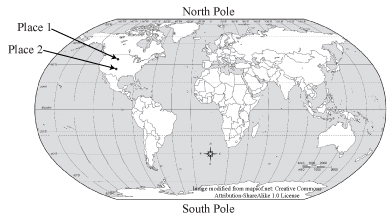Item CL123002: As the earth moves around the sun during a year, places closer to the north pole have more hours of daylight when the north pole is angled toward the sun.
As the earth moves around the sun during a year, do changes in the North Pole's angle with respect to the sun affect whether Place 1 or Place 2 gets more hours of daylight?

- Yes, when the North Pole is angled toward the Sun, Place 1 is in sunlight for more hours during a day than Place 2, so Place 1 has more hours of daylight.
- Yes, when the North Pole is angled toward the Sun, Place 2 is in sunlight for more hours during a day than Place 1, so Place 2 has more hours of daylight.
- No, Place 1 and Place 2 are both in the northern hemisphere, so they have the same number of hours of daylight regardless of whether the North Pole is angled toward the Sun.
- No, Place 1 and Place 2 have a different number of hours of daylight during a day, but the difference does not depend on whether the North Pole is angled toward the Sun.
Answer Choice |
Overall |
Grades |
Gender |
Primary Language |
||||
|---|---|---|---|---|---|---|---|---|
| n = 2182 |
6–8 n = 1085 |
9–12 n = 1088 |
Male n = 1070 |
Female n = 1032 |
English n = 1836 |
Other n = 247 |
||
| A. | Yes, when the North Pole is angled toward the Sun, Place 1 is in sunlight for more hours during a day than Place 2, so Place 1 has more hours of daylight. | 32% | 31% | 34% | 35% | 29% | 33% | 31% |
| B. | Yes, when the North Pole is angled toward the Sun, Place 2 is in sunlight for more hours during a day than Place 1, so Place 2 has more hours of daylight. | 26% | 26% | 25% | 25% | 25% | 25% | 28% |
| C. | No, Place 1 and Place 2 are both in the northern hemisphere, so they have the same number of hours of daylight regardless of whether the North Pole is angled toward the Sun. | 27% | 28% | 27% | 26% | 29% | 28% | 28% |
| D. | No, Place 1 and Place 2 have a different number of hours of daylight during a day, but the difference does not depend on whether the North Pole is angled toward the Sun. | 15% | 15% | 14% | 14% | 16% | 15% | 13% |

